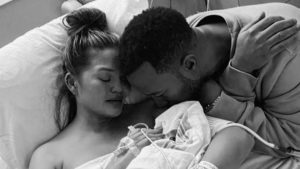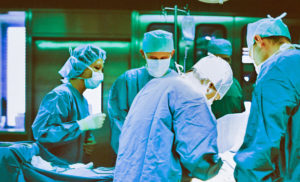It is clear, reading This is Going to Hurt, Adam Kay’s 2017 memoir, that he had a breakdown at the end of his years as an NHS junior doctor in obs and gynae: “brats and twats”. This is frightening for us — the NHS he describes is fraying and unsafe — and emotionally disastrous for him. Now, a seven-part BBC series, starring the likeable Ben Whishaw — this casting is surely deliberate — tells us Kay’s story, or part of it at least.
The BBC series is the NHS flying a tattered flag. It contrasts the maternity units of the NHS with the soothing hotels that are private London clinics. The TV show is a travesty of the book, which I suspect the BBC considered unfilmable, though it would have made for a better, and more chilling, piece of art.
The memoir is riven with self-hatred, and hatred for female bodies. It contributes to the already swollen canon of female shame. Its gaze is so masculine the TV show had to invent a leading female character out of nothing, for balance. Kay’s original women are a collection of constituent body parts, no more. They exist to be judged and be saved. Their experience is laughable.
It is not like that from the other side of the screen. I remember, after my son’s birth in a London teaching hospital, my abdomen swelling with paralytic ileus after an emergency caesarean section. Paralytic ileus is a frozen bowel. It is quite common after abdominal surgery. I begged a junior doctor to help me, since I was vomiting shit into a bowl. He turned away, vexed, and I staggered back to bed.
My journalistic instincts saved me. The next time I vomited into the bowl I took it to the nurses’ station. I was swollen and gassy, and it seemed to take an age to get there. I put the bowl down and said something like: “Is this normal?” I was taken to a high-dependency ward, my stomach was syringed, and I was given a drip, and that saved my life. It didn’t occur to me to complain. I had taken too much morphine during labour — I am a recovering addict and I lied to a midwife to get morphine, about which I am profoundly ashamed — and so it was partially my fault. And I had a live baby.
I think I also had PTSD from the experience, and that is why I didn’t have another child. I don’t think they are allowed to tell you that to have a first child at 40, when obese, is dangerous. It is all dangerous, particularly for black women, who are four times more likely to die during pregnancy in the UK than white women. None of it is laughable unless you yearn for denial.
Kay himself is in denial. In his memoir, when a baby dies, he “went for six months without laughing”. But he plays it for laughs. He became a comic when he left medicine, shortly after this baby died. “When cornered,” he writes, “I would reach for my red nose and clown horn and bring put my anecdotes about objects in anuses and patients, ‘saying the funniest things’”. This passage comes at the end of the memoir, and it is a fragment of the book he should have written.
But he can’t write that book because it would be too truthful, and it is not the book people wish to read. Instead, we have his disgust, for instance, for old women. He hates the urogynaecology clinic: “a bunch of nans” — defined, with the use of “nan”, by their child-bearing — “with pelvic floors like quicksand and their uteri stalactite-ing into their thermals”. No matter their predicament, the misery is all his: “And then a patient sneezes, you have to get a mop and bucket.”
We have his disgust for the sex worker who has a Fireman Sam sponge trapped inside her. She needs to repress her menstruation so she can have more clients, and more money. (She does not know the contraceptive pill will do this for her. The insertion of the Fireman Sam Sponge was pitiful, not laughable.) Stolen or not — I have no idea how Kay approaches patient confidentiality — I would love to read her story. Instead, we read of her smell: “I imagine every bunch of flowers in the hospital suddenly wilted.” “Christ knows,” he adds, “how she explained the change in [Fireman Sam’s] appearance to her children.” It is vexing too that the sponge, “had been schnitzel-ed flat by her clients’ pummellings”.
Women are reduced, consciously or not, to a series of stinking and repulsive orifices with imbeciles attached to them. The misogyny — the dehumanisation I am sure kills women — is relentless. At one clinic the women are, “crotchety as a pen of wet hens…they grunt their way through their appointments”. He is similarly glib about the woman who sleeps with three men in one night and asks if, under these circumstances, the morning after pill will still work.
Another sex-worker, a stripper he meets at a stag night, has “Trichomonas Vaginalis…the tell-tale green discharge residue on the stripper’s vulva”. A woman with an open abdomen is “a horrendous Teletubby”. Another has a “grossly swollen vulva from a mistletoe contact allergy”. A woman was admitted who placed a Kinder Egg containing an engagement ring for her lover inside her, and it got stuck. It is, for Kay, “unexpected, disgusting”. It was a mistake, and it wasn’t supposed to be public. It wasn’t public, until she had the misfortune to meet Adam Kay.
He mocks, too, women who seek to control their terror in their own ways: the woman who tries to eat her placenta but eats instead her blood clots by mistake; the woman who arrives with a “nine-page birth plan, in full colour and laminated”. I think of why she did this, and how she felt when she did — I remember folding my unborn son’s clothing again and again, like a charm — but Kay has no time for this.
One anecdote exposes the depth of his self-deception. He sees a teenage girl who tried to trim her labia, because she thinks it is too big. Kay is horrified: “How long,” he asks, “until we are seeing girls stapling their vaginas tighter?” The answer is a year. His colleague meets a woman who superglued her vagina on her lover’s insistence, to make it tighter. Yet what woman reading his memoir could feel anything but horror for her own body, its secretions and its magic?
Kay, whose father was a doctor, regards medicine with Oedipal rage. I don’t think he ever wanted to do it. He has valuable testimony on the plight of junior doctors, and the chaos of parts of the NHS, but he confuses righteous anger with his own pain and, in doing so, makes a bonfire of the privacy and dignity of his patients. Saving their lives is only his permission to despise them. He is utterly oblivious to the intensity of female shame; in his metier and his chronic self-absorption, he courts it, but he still thinks himself decent. When he says, “this is going to hurt”, he is not speaking of his patient, but of himself.
You can’t expiate your pain at the expense of women at their most vulnerable. There is too much disgust with women’s bodies in the wider culture. Not maidens, of course (like babies, they are perfect) but women doing what their bodies are supposed to do. But even when Kay’s paper women do this — and they do nothing but this, with blood and screams — they do not feel real, because in his writing they do not have souls.
Even the invented female character for the TV show — a fascinating young woman, bright and diligent — is diminished, quite literally, by her appearance in his story. She dies and, if you consider his genre, it does make sense. Some women are turned into constituent body parts. But if you are important enough, you might make to corpse.
Disclaimer
Some of the posts we share are controversial and we do not necessarily agree with them in the whole extend. Sometimes we agree with the content or part of it but we do not agree with the narration or language. Nevertheless we find them somehow interesting, valuable and/or informative or we share them, because we strongly believe in freedom of speech, free press and journalism. We strongly encourage you to have a critical approach to all the content, do your own research and analysis to build your own opinion.
We would be glad to have your feedback.
Source: UnHerd Read the original article here: https://unherd.com




